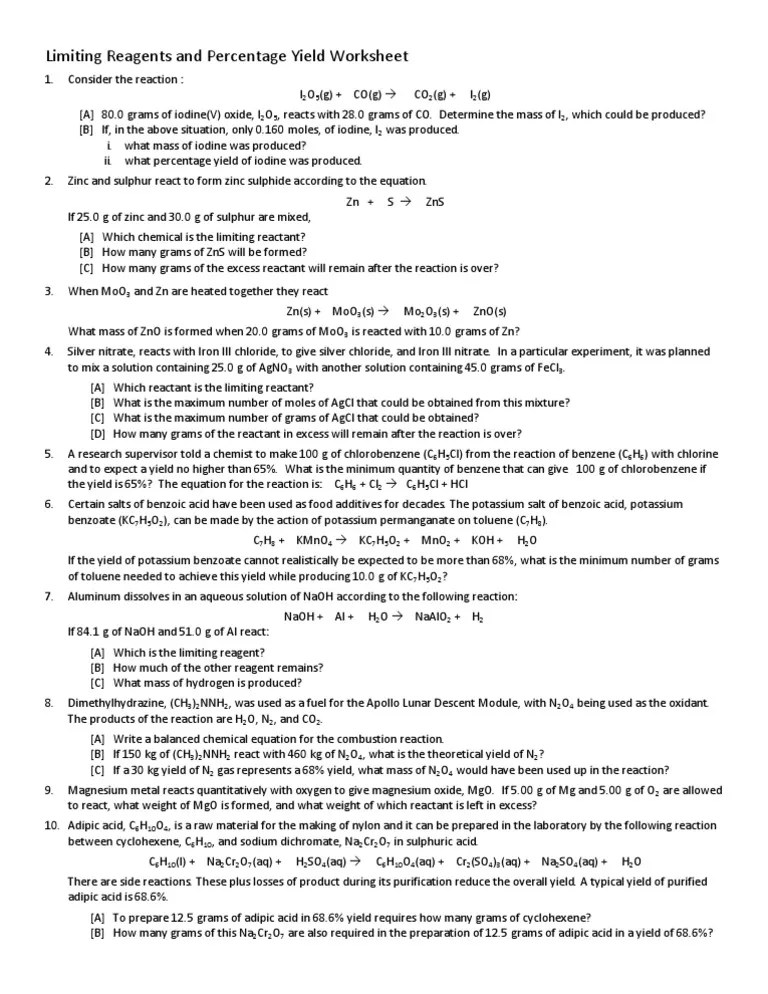Percent Yield Limiting Reactant Worksheet
Percent Yield Limiting Reactant Worksheet - In an experiment, 3.25 g of nh 3 are allowed to react with 3.50 g of o 2. Up to 24% cash back i) what mass of iodine was produced? 4) if 16.1 grams of sodium chloride are formed in the reaction, what is the percent yield of this reaction? Limiting reactant and percent yield worksheet. Solve stoichiometric problems from a balanced chemical equation. 6) in the reaction of zn with hcl,. When copper (ii) chloride reacts with sodium nitrate, copper (ii) nitrate and sodium chloride are formed.
Up to 24% cash back limiting reagent & percent yield practice worksheet 1. Use the folowing equation for the oxidation of aluminum in the following problems. 1) write the balanced equation for the reaction that occurs when iron (ii) chloride is. 4al + 3o 2 2al 2 o.
Up to 24% cash back a) which chemical is the limiting reactant? First balance the chemical equation, then perform the requested calculations. Up to 24% cash back limiting reactant & percent yield worksheet. Solve stoichiometric problems from a balanced chemical equation. The overall document is a worksheet to practice skills in limiting reactants, theoretical yields, and percent yields for multiple chemical reactions. 4al + 3o 2 2al 2 o.
Limiting Reagents and Percentage Yield Worksheet Zinc Chemical
This document provides 5 chemistry problems. Limiting reactant and percent yield worksheet. Up to 24% cash back a) what is the limiting reactant? C) how many grams of the excess reactant will remain after the reaction is over? 4al + 3o 2 2al 2 o.
B) what is the maximum amount of each product. Nh 3 + o 2 no + h 2 o. Ii) what percentage yield of iodine was produced. Up to 24% cash back i) what mass of iodine was produced?
Differentiate Between The Actual Yield And Theoretical Yield Of A Chemical Reaction.
Up to 24% cash back a) which chemical is the limiting reactant? The overall document is a worksheet to practice skills in limiting reactants, theoretical yields, and percent yields for multiple chemical reactions. To calculate the percent yield, we take the actual yield and divide it by the theoretical yield and multiply by 100 (equation \ref{yield}): When copper (ii) chloride reacts with sodium nitrate, copper (ii) nitrate and sodium chloride are formed.
The Limiting Reagent Gives The Smallest Yield Of Product Calculated From The Reagents (Reactants).
Zinc and sulphur react to form zinc sulphide according to the equation. In an experiment, 3.25 g of nh 3 are allowed to react with 3.50 g of o 2. Up to 24% cash back limiting reactant. Limiting reagent & percent yield practice worksheet 1.
Limiting Reagents And Percentage Yield Worksheet 1.
For the following reactions, find the following: B) how many grams of zns will be formed? C) how many grams of the excess reactant will remain after the reaction is over? 1) write the balanced equation for the reaction that occurs when iron (ii) chloride is.
Ca(Oh) 2 + 2Hcl Cacl 2 +.
4al + 3o 2 2al 2 o. Limiting reagent and percent yield review worksheet limiting reagent problems 1. Up to 24% cash back limiting reagent & percent yield practice worksheet 1. When copper (ii) chloride reacts with sodium nitrate, copper (ii) nitrate and sodium chloride are formed.
5 co2(g) + i2(g) a) 80.0 grams of iodine(v) oxide, i2o5, reacts with 28.0 grams of. 1) 125 grams of hydrochloric acid react with 150 grams of zinc. 6) in the reaction of zn with hcl,. To calculate the percent yield, we take the actual yield and divide it by the theoretical yield and multiply by 100 (equation \ref{yield}): B) how many grams of zns will be formed?






